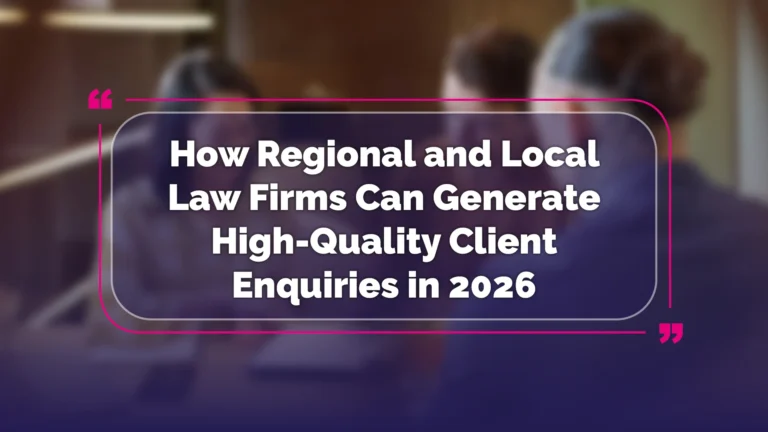Key Takeaways – blended marketing for law firms:
- Blended marketing combines digital and traditional methods for maximum reach.
- Set clear goals for each channel, such as engagement for social media and lead generation for PPC.
- Address specific client concerns in each campaign to build trust and relevance.
- An experienced marketing partner can guide your firm in creating effective, compliant campaigns.
Marketing for law firms has become increasingly multi-dimensional, requiring a blend of digital and traditional methods to reach and resonate with target clients. For solicitors in family law, conveyancing, immigration law, and personal injury, it’s crucial to employ a marketing approach that effectively addresses the needs and concerns of potential clients. A blended marketing campaign—combining channels like PPC, social media, SEO, and email with print or direct mail—allows firms to communicate consistently across platforms and amplify their message. A law firm marketing agency can help law firms enhance their marketing efforts with professional support, especially for those who may not have the budget to hire one.
1. Understanding Law Firm Marketing
Law firm marketing is a crucial aspect of a law firm’s growth and success. It involves promoting a law practice or firm to attract new clients and increase visibility. Effective law firm marketing can help a law firm establish a strong online presence, build brand awareness, and attract potential clients. A comprehensive law firm marketing plan should include a mix of digital marketing, SEO, blogging, print, and digital ads.
In today’s competitive legal landscape, having a robust marketing strategy is not just an option but a necessity. By leveraging various marketing channels, law firms can ensure they reach a broader audience and stand out in a crowded market. Whether it’s through engaging blog posts that showcase your expertise, targeted PPC campaigns that capture immediate interest, or well-optimised SEO efforts that improve your search engine rankings, each element plays a vital role in drawing potential clients to your firm.
2. Understanding Blended Marketing Campaigns for Law Firms
A blended marketing campaign uses multiple online and offline platforms to create an omnipresent brand, making it easier for prospective clients to encounter your message wherever they may be. For instance, a family law solicitor might combine Google PPC ads targeting “divorce solicitor near me” with Facebook posts offering information on child custody. Together, these channels engage clients at different stages of their search.
Pro Tip: Develop a consistent tagline or visual element that clients will remember across different platforms, helping your firm to build brand recognition.
3. Setting SMART Goals for Your Law Firm
Setting SMART (Specific, Measurable, Achievable, Relevant, and Time-bound) goals is essential for a law firm’s marketing strategy. SMART goals help ensure that marketing efforts are focused, measurable, and attainable. For example, a SMART goal for a law firm might be to increase leads received from Google search ads by 15% in the next quarter, aiming for a 10% boost in client acquisition. By setting SMART goals, a law firm can track its progress and adjust its blended marketing strategy accordingly.
When you define clear objectives, it becomes easier to allocate resources effectively and measure the success of your campaigns. For instance, if your goal is to enhance your firm’s visibility in family law, you might set a target to publish two blog posts per month on relevant topics and track the engagement they generate. This approach not only keeps your marketing efforts aligned with your business objectives but also provides a roadmap for continuous improvement.
4. When to Use Blended Marketing Campaigns
Blended marketing campaigns are ideal for solicitors launching a new service, hosting a community event, or focusing on a specific area of law. Establishing a clear law firm marketing strategy with SMART goals is crucial to measure outcomes and adapt initiatives effectively. For example, a conveyancing firm could send direct mail with informational guides on first-time home-buying, followed up with a Google Ads campaign targeting keywords like “conveyancing solicitor” to attract individuals already interested in buying a home.
In other cases, immigration law firms may use LinkedIn and Facebook ads that target specific audiences while running blog posts or SEO content focused on common immigration challenges. These different approaches work together to build trust with prospective clients who see the firm as knowledgeable and supportive.
5. Defining Goals and Targets for Your Law Firm Marketing Strategy
To get the most from blended marketing, consider these key channels and how they can complement each other:
- Email Marketing: Reach prospective clients with valuable information, like updates on changes in personal injury law or newsletters focused on family law guidance.
- PPC Advertising: Ideal for attracting clients actively searching for services like divorce or immigration assistance.
- Social Media: Facebook and LinkedIn are excellent for reaching different demographics, with Facebook for broader audiences and LinkedIn for professional connections.
- SEO: Ensures your firm is easily found by those searching for terms related to services like conveyancing or personal injury claims.
- Landing Pages: Create tailored landing pages for each campaign, focusing on converting visitors through relevant and targeted content.
- Offline Marketing: Direct mail or event sponsorships can reach a more localized audience and reinforce digital efforts, especially for firms with a strong community presence.
Integrating a law firm’s marketing plan with various strategies is crucial, particularly highlighting the role of video marketing for enhancing online presence and engagement.
Example: An immigration law firm could run a series of Facebook ads on visa application support, then retarget visitors with Google PPC ads directing them to a landing page with an introductory consultation offer.
5. Targeting Prospective Clients’ Needs
Every campaign should start with clearly defined goals to guide its direction. If a family law solicitor aims to increase consultations for child custody cases, set specific key performance indicators (KPIs) like phone inquiries or form submissions related to this service.
Pro Tip: Specify goals for each channel (e.g., Facebook for engagement, Google Ads for leads) to keep each tactic measurable, maximising return on investment.
7. Identifying Your Target Audience
Identifying a target audience is crucial for any law firm. A target audience includes potential clients, current clients, and former satisfied clients who can provide positive reviews and recommendations. To identify a target audience, a law firm should research its ideal client demographics, interests, needs, and concerns. Creating detailed customer personas can help a law firm understand its target audience and tailor its marketing efforts to meet their needs.
Understanding who your clients are and what they need allows you to craft messages that resonate with them. For example, if your firm specialises in personal injury law, your target audience might include individuals who have recently been in accidents and are seeking legal advice. By developing personas that detail their demographics, pain points, and preferred communication channels, you can create more effective and personalised blended marketing campaigns that speak directly to their concerns.
8. Knowing When to Use the Right Digital Marketing Channels
The success of a campaign depends on its relevance to client needs. A personal injury firm, for instance, might find more engagement in content focused on “what to do after a car accident.” By speaking to specific concerns, like the legal steps involved in a claim, these ads or blog posts make the firm’s services more appealing to potential clients.
Example: A family law solicitor could use targeted Google ads focused on terms like “divorce and child custody lawyer,” with a landing page that addresses common questions and concerns about custody arrangements.
9. Knowing When to Use the Right Channels
Certain channels are better suited for different aspects of client acquisition:
- New Client Acquisition: Google Ads and SEO are effective for legal clients who are actively searching for services.
- Brand Building: Social media and local sponsorships can build community trust and reinforce your firm’s brand.
- Client Retention and Re-engagement: Email marketing and retargeting ads work well to maintain relationships and keep past clients informed.
Actionable Tip: Use demographic data from social media and analytics to determine which channels attract different client groups, helping you customise blended marketing campaigns to specific audiences.
10. Digital Marketing Strategies
Digital marketing is a vital tool for law firms to grow and prosper. Effective digital marketing strategies can enhance a law firm’s visibility, credibility, and overall success. Some key digital marketing strategies for law firms include:
- Search Engine Optimisation (SEO): Ensuring a law firm’s website ranks high in search engine results pages (SERPs) by optimising for relevant keywords and creating high-quality content.
- Pay-Per-Click (PPC) Advertising: Displaying targeted ads on search engines and social media platforms to attract potential clients actively searching for legal services.
- Social Media Marketing: Engaging with clients and sharing legal insights, case studies, and relevant news on social media platforms like Facebook, LinkedIn, and X (Twitter).
- Email Marketing: Building an email list of existing and potential clients and sending newsletters, legal updates, and event invitations to keep them informed and engaged.
- Website Design and User Experience: Creating a user-friendly, mobile-responsive, and visually appealing website with clear calls-to-action to convert visitors into clients.
By implementing these digital marketing strategies, law firms can create a strong online presence, attract more potential clients, and ultimately drive growth and success.
11. Crafting a Compelling Blended Marketing Campaign
Crafting a unified message is essential. This includes:
- Consistent Messaging: Keep a uniform tone across channels, ensuring each platform reflects your firm’s brand values.
- Effective CTAs: Use clear, actionable calls-to-action, like “Contact us for a free case review” or “Download our guide on divorce proceedings.”
Example: A personal injury solicitor could combine Google Ads with a Facebook retargeting campaign, using a consistent message about “getting the compensation you deserve.” Directing users to a landing page with resources about personal injury claims and a free consultation CTA can help convert leads.
12. Measuring Success
Success is best measured by monitoring key metrics across platforms:
- Conversion Rate: Track how many people complete your desired action, such as booking a consultation.
- Engagement: Social media engagement rates (likes, shares, comments) can indicate interest in your services.
- Cost-per-Lead (CPL): Calculating CPL for each channel reveals the most cost-effective strategies.
Pro Tip: Use tools like Google Analytics or Facebook’s Ad Manager to regularly review and optimise blended marketing campaigns based on performance data.
13. Compliance and Ethical Considerations
Law firms must adhere to ethical guidelines when using digital marketing. Digital marketing offers immense benefits for law firms, but it also requires careful consideration of ethical implications. Some key compliance and ethical considerations for law firms include:
- Adhering to the Solicitors Regulation Authority (SRA) guidelines on digital marketing: Ensuring all marketing practices comply with the regulatory standards set by the SRA.
- Ensuring transparency and honesty in all marketing communications: Avoiding misleading or deceptive practices and providing clear, accurate information to potential clients.
- Respecting client confidentiality and data protection: Safeguarding client information and complying with data protection laws such as the General Data Protection Regulation (GDPR) and the Data Protection Act 2018.
- Avoiding misleading or deceptive marketing practices: Ensuring all claims and representations are truthful and substantiated.
- Complying with the General Data Protection Regulation (GDPR) and the Data Protection Act 2018: Ensuring all data collection and processing activities are lawful and transparent.
By understanding these compliance and ethical considerations, law firms can ensure that their digital marketing efforts are both effective and ethical, maintaining the trust and confidence of their clients.
14. Finding the Right blended Marketing Partner
A skilled partner is essential for campaign success, especially when legal marketing requires compliance and specialization. Seek out a partner with a strong background in legal marketing who can demonstrate experience through case studies or testimonials.
Actionable Tip: Verify any potential partner’s experience with similar clients or legal practices, ensuring they understand the nuances of marketing for areas like family law or conveyancing. Additionally, a law firm’s website is a crucial tool for establishing an online presence and attracting potential clients.
To discover how our team can support your marketing needs, learn more about our services here.
Conclusion
Blended marketing campaigns offer law firms a way to reach prospective clients across different channels, ensuring their message resonates and engages in a meaningful way. By understanding each channel’s strengths, targeting client needs, and setting clear goals, solicitors in family law, conveyancing, immigration, and personal injury law can make a more significant impact, build trust, and attract the clients they want. The right strategy, combined with a knowledgeable marketing partner, can elevate your firm’s brand and drive growth through multi-channel engagement.




